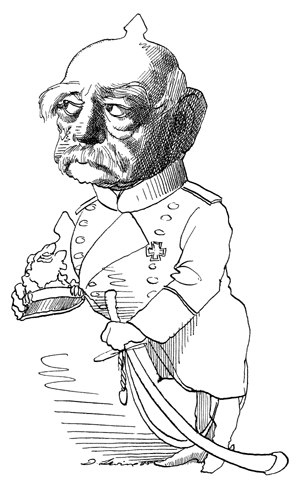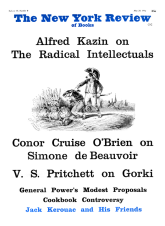Napoleon, Bismarck, Lenin—all three changed the face of Europe and each contributed to the making of our midtwentieth century world. In each case, the achievement transcends the man, and although the temptation to write their biographies will recur in each generation, the difficulty of doing so remains almost insuperable. However much “world-historical” individuals on this scale may seem to disprove the view of history that sees great events solely as the result of social change and economic pressures, nevertheless it is impossible to write the life of any one of them without also writing about the whole complex of political forces, economic trends, and social movements with which they had to contend and which they had to try and master. In a biography of this kind, the man who is its subject often fades away, his human characteristics overlaid by his historical significance. Perhaps in the case of a cold power-seeking rationalist like Napoleon or an inspired and ruthless doctrinaire like Lenin, this does not much matter; but in Bismarck’s case the individual personality is always imposing itself on our view of the statesman, and thus the biographers have been faced with problems of a psychological as well as of a historical kind and have often found it hard to strike the balance between them.
Throughout Germany at the end of the last century Bismarck monuments of all kinds preserved the image of the Iron Chancellor, as he was commemorated by the painters and sculptors of the day, and this picture of the Olympian Bismarck, masterful, farsighted, impassive, the wise father-figure whose loss prevented the Germans from realizing the full potentialities of the Empire which he had created for them, has died hard. It is only in the recent biographies by the late Erich Eyck (a neglected masterpiece which should certainly be made available in a full English translation instead of in an unsatisfactory abridgement), A.J.P. Taylor, and now Werner Richter, that the true character of the man and the weaknesses of the statesman are beginning to emerge. Herr Richter is an experienced biographer who has written the lives of many nineteenth-century figures, both German and foreign, and he has, without adding much that is new to the accounts and interpretations of his latest predecessors, produced a serious—even solemn, skillfully composed and well-balanced book, excellently translated by Brian Battershaw. While concentrating on Bismarck’s political career, and especially on his foreign policy, he gives us enough detail about his personal life to start us wondering what Bismarck was really like. It is hard to resist the conclusion that he was a very unpleasant man indeed, vindictive, bad-tempered, coarse, and philistine. Yet he was much more complicated than either his admirers have suggested or his critics allowed. The large, over-powering physical appearance was belied by the succession of psychosomatic ailments which plagued him all his life; the vast appetites (his favorite drink was a mixture of champagne and stout) contrast with a sensibility that could lead to outbursts of violent sobbing; the rusé diplomat was happiest walking alone with his huge dogs through the forests of his country estates. Are these characteristics of more than psychological interest or are they also of historical importance?
Certainly, Bismarck’s vindictiveness, his ruthless refusal to allow any opposition or criticism or to tolerate anyone near him who might challenge his power, prevented the emergence of men who could eventually take over from him. The constitution of the Bismarckian Empire, like that of the Fifth Republic in France, was custom-made for its founder and would not fit anyone else. The hatred which Bismarck felt for his opponents, and especially for Windhorst, the leader of the Catholic Center Party, prevented him from ever cooperating with them even when circumstances had changed and he had need of them for his own policies. By the end of his career, his self-esteem and obstinacy led him to ignore much of importance that was going on around him.
Herr Richter follows Erich Eyck in being basically critical of much of Bismarck’s later career, and, like A.J.P. Taylor, he rejects the old conventional German view that Bismarck entered politics with a clear set of political aims which he then proceeded to achieve by a series of masterly maneuvers. He shows more understanding for Bismarck’s foreign policies than for his domestic ones; he neglects the problems presented by the rise of the social-democratic movement in Germany and by Bismarck’s very real fear of the socialists. However, for the most part his political narrative is clear and accurate, and he is particularly good in his assessment of the results of the war of 1866. Bismarck, by his pursuit of limited aims and by the creation of a united Germany on a “kleindeutsch” basis under Prussian hegemony and with Austria excluded, produced a situation in which, to quote Herr Richter,
Advertisement
Some ten million Germans now ceased to regard Germany as their homeland…by excluding [Austria] from Germany he delivered her over to the struggle of Nationalities which the Germans of Austria were quite unable to control…Austria now actually acquired the quality which precipitate progressives had prematurely ascribed to her. She became incapable of survival.
And in 1879, as Herr Richter suggests, Bismarck, by working for a close alliance with Austria-Hungary, was trying to redress the balance. The irony of the Austro-German alliance is that for Bismarck it was a means of controlling Austrian policy and of preserving the status quo in Eastern Europe; for his successors it was a way of giving Austria a blank check and thus, in the crisis of 1914, leaving the initiative for peace or war in Austria’s hands and encouraging her to plunge the whole world into war for her Balkan policies.
However, it is unfair to judge Bismarck with the hindsight of a century and with the perspective given by two world wars, even though perhaps he is not ultimately without responsibility for them, just as it is a mistake to take his own criticisms of his successors, made in the bitterness of retirement and extreme old age, too seriously. Although he thought he could do better (“könnte ich doch in die Schweinerei hineinfahren!”—if only I could get to grips with the mess they’ve made), his greatest achievements were already long behind him by the time of his fall in 1890. It is on his actions in the 1860s that his reputation will finally rest—the dazzling virtuosity with which he seized his opportunities and transformed Prussia, Germany, and Europe within a single decade.
When summoned to power by a reluctant king, who had never liked him, Bismarck faced an immediate problem, the deadlock between the King and the Prussian Diet which refused to pass the budget—and also a long-term one—how to meet the growing demands for German unity without sacrificing the position of Prussia in Germany or the position of the Junker class, to which Bismarck himself belonged, within Prussia. Bismarck once described his sentiments as being “those of a vassal of the elector of Brandenburg,” and perhaps the most remarkable of his achievements, as well as, in the long run, one of the most disastrous, was to enable the feudal values of the old Brandenburg-Prussia to survive into the industrialized capitalist society of twentieth-century Germany. He did this by means of an opportunistic policy which turned each situation to his advantage, even though it cost him the friendship of those Prussian conservatives like Ludwig von Gerlach, who believed that the essence of the Prussian tradition was honor and morality. “Let us beware,” Gerlach wrote, “of the hideous and mistaken doctrine that God’s holy ordinances do not apply to the sphere of politics, of diplomacy and war.” It was a doctrine that Bismarck, who believed that Germany and Austria were states too great to be bound by the texts of treaties, was bound to dismiss as sentimental “humanitarian babbling.” Although he conformed superficially to the pietist Protestant beliefs of his wife and of her friend Marie von Thadden, who had been the great love of his life, Bismarck’s God was simply an even larger version of himself.
In the 1860s Bismarck was able to use foreign policy to solve his internal problems: after the creation of the North German Confederation as a result of the defeat of Austria and the South German states in 1866, all but the most intransigent of Prussian liberals were prepared to forget their quarrel with Bismarck and vote him an indemnity for his unconstitutional behavior in governing without a parliamentary budget. It was at this stage of his career that his diplomatic mastery was most apparent—and also his lack of principle. He was not afraid of liberalism, although in his old age genuinely alarmed about the possibility of a socialist revolution, but he was able to trade on the Austrian government’s fears and their need, in the years before 1866, of Prussian help to suppress liberalism in Germany. Bismarck perhaps did not even care much about German unity, yet he succeeded in obtaining it, not only without having to surrender German territory in the Rhineland to Napoleon III as the price of French non-intervention in the wars of 1864 and 1866, but also, casually and almost incidentally, provoking France into declaring war in 1870 so that Napoleon lost his throne and the new Germany was left by far the strongest power on the continent.
“It is the lees left by Bismarck which still foul the cup,” the British Foreign Secretary, Sir Edward Grey, wrote in 1906 to President Theodore Roosevelt. Certainly, Bismarck’s cult of Realpolitik and of raison d’état made the conduct of international relations more openly cynical than it had been for many years. Moreover, Bismarck, in his anxiety to protect the interests of his own class, failed to make the new Germany a truly united society; and this certainly played a large part in provoking the malaise of Germany in the early twentieth century and thus contributing to two world wars. No wonder that we are now more critical of Bismarck’s achievements than previous generations were. Perhaps the merit of Herr Richter’s book results from the fact that he is not an émigré like Eyck, for whom life in Germany was made impossible by Hitler, nor yet a hostile Englishman like Taylor, but a responsible and serious German publicist taking a dispassionate fresh look at Bismarck and thus contributing to the demolition of some of the most cherished German legends.
Advertisement
This Issue
May 20, 1965




